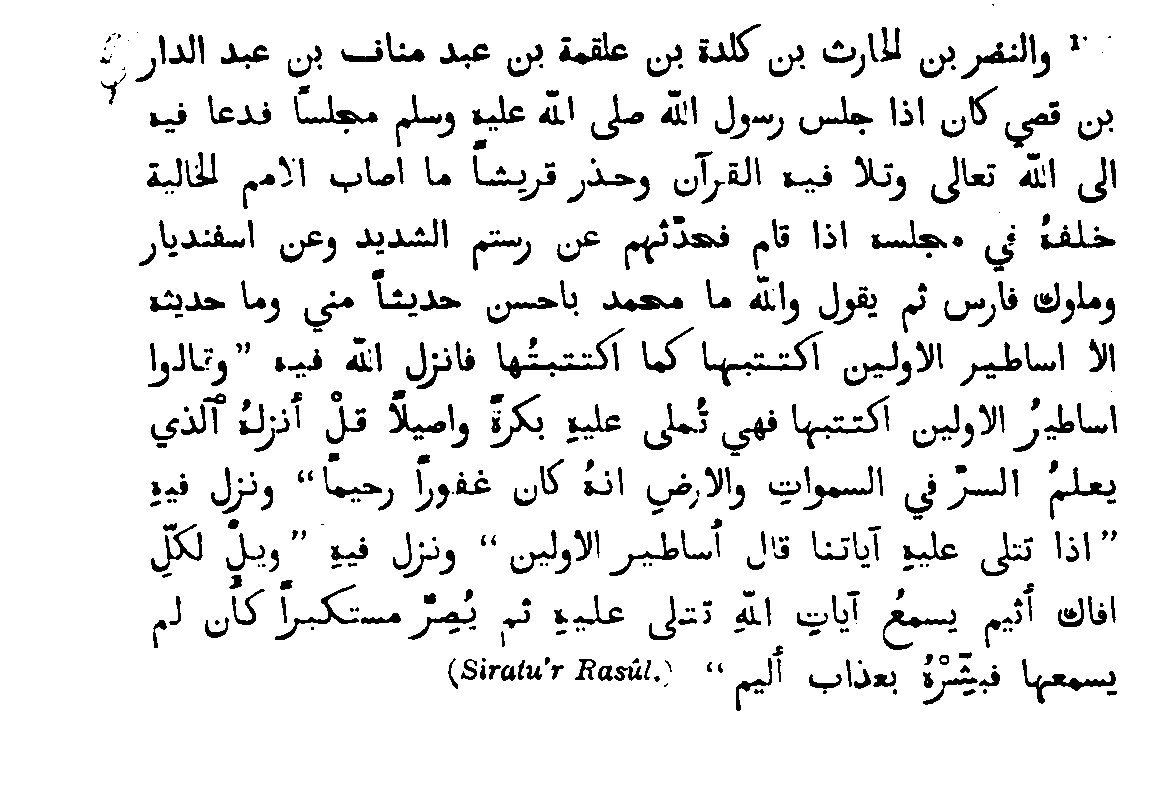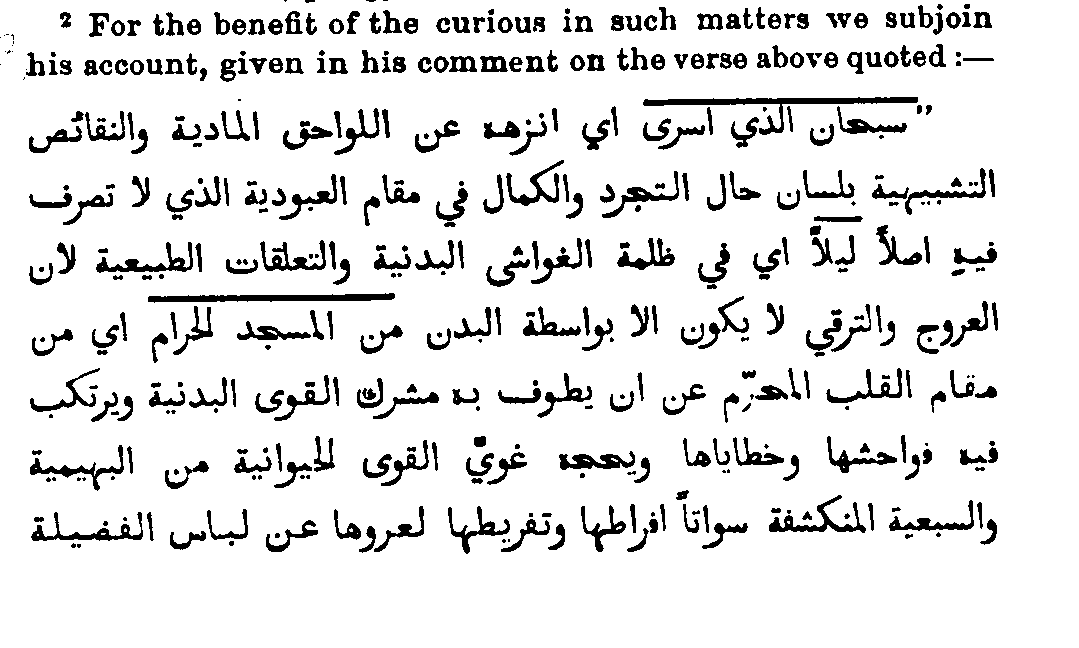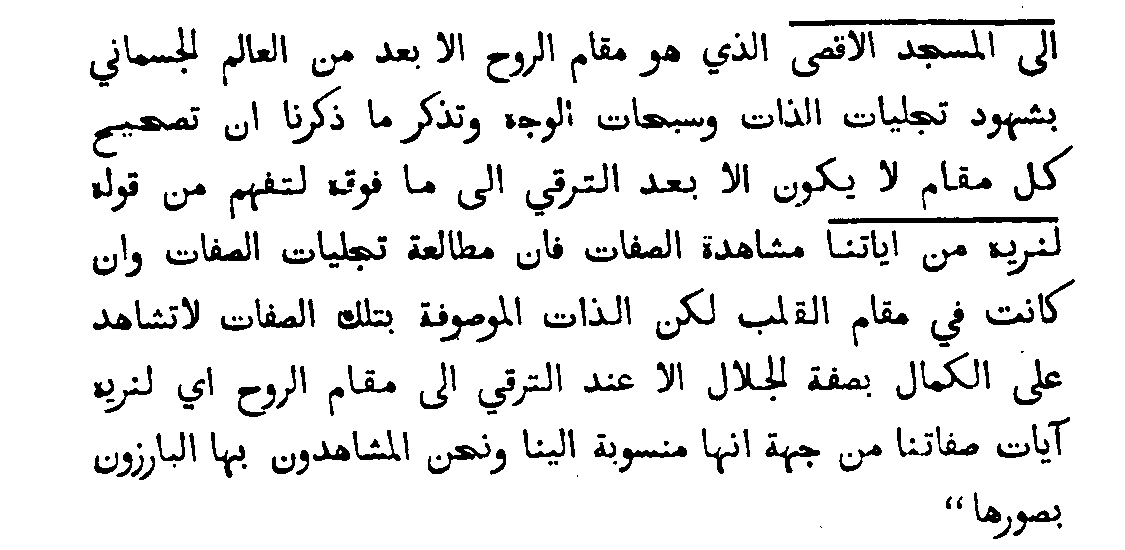2 Siratu'r Rasul, pp. 24, 25.
3 Ut supra:
4
5 Sir W. Muir, Life of Mahomet, pp. xcvii and 31, 32.
6 Surah XXV., Al Furqan, 6, 7.
7 Surah LXVIII., 15.
8 Surah XLV., 6, 7.
9
10 Vendidad, I., 1, 2, &c.
11 pp. 206, 207.
12 Siratu'r Rasul, p. 139.
13
14 Against this latter hypothesis, however, must be
considered the fact that in Surah LIII., An Najm, 13-18, Muhammad clearly asserts that
he saw the Sidratu'l Muntaha', which stands in the highest heaven. These verses
must refer to this Miraj, and may be thus rendered:—
15 Siratu'r Rasul, pp. 138, 139.
16 Mishkat, pp. 518-20.
17 "The Lotus of the Boundary," so called because
even Gabriel must not pass it.
18 pp. 206 sqq.
19 Such as the Qisasu'l Anbiya,
the Araisu't Tijan, the Raudatu'l Ahbab, &c.
20 Qisasu'l Anbiya, pp. 337, 338.
21 Perhaps an invention to make him bear comparison
with our Lord: cf. Heb. vi. 19, 20.
22 Arta Viraf Namak.
23 Ormazd is the later form of the Avestic
Ahura Mazdao, the Good God of Zoroastrianism.
24 Three courts or Paradise, called in the Avesta
Humata ("good thought"), Hukhta ("good word") and Hvarsta
("good deed"). They correspond to the Star Court (Storey of the Stars), Moon Court,
and Sun Court respectively.
25 Cap. ci.
26 Vendidad, cap. v.
27 "Testament of Abraham," Rec. A., cap. x.
28 Liber Henoch, capp. xiv, xv, sqq.
29 In the Targum of Jonathan, for example, we are told
that the Tree of Life was 500 years' journey in height! The Muslims confound this
with the Tree of the Knowledge of Good and Evil, which they take to have been the wheat
plant. Of it we are told that it presented itself before Adam to tempt him to eat of it. Adam
rose to his full height, "500 years' journey" to avoid it, but the plant grew and kept
on a level with his mouth (Qisasu'l Anbiya, p. 17).
30 2 Cor. xii. 2-4.
31 A Muhammadan might add, "If we reject the account
of Muhammad's ascension, how can we accept those of Enoch, Elijah, and Christ?" The answer
is not far to seek. The historical evidence for Christ's ascension is unquestionable, and we
accept the other accounts upon His authority. Moreover, to urge that there can be no genuine
coins because there are known to be some spurious ones in circulation is not very logical.
There would be no spurious ones if there had not been genuine coins, upon the model of
which the latter have been made. Hence the very existence of so many legends of ascensions
should lead us a priori to infer that these must be based upon some one or more true
accounts of such occurrences. Moreover, as the true coin may be known from the false by
it's ring, so a comparison between the biblical narratives (Gen. v. 24; 2 Kings ii. 11, 12 ; Acts i. 9-11)
and those others which we have been dealing with will suffice to show what an immense
difference exists between them. For instance, St. Paul tells us of some one who (whether in
the body or not he did not know) was "caught up to the third heaven, and heard unspeakable
words, which it is not lawful for a man to utter." But the apocryphal "Visio Pauli" states that
Paul was the person referred to, and puts in his mouth a long account of what he saw and heard
there. The difference is much the same as that which existed between the testimony of a sober
historian and the wonderful tales contained in the Arabian Nights.
32 Dr Koelle, Mohammed and Mohammedanism, pp. 246 sqq.
33 Similar passages may be found in Surahs II., IV., XIII., XXXVI.,
XXXVII., XLVII., LXXXIII., &c.
34 Wine is shown to be meant from the context. Rivers of wine
are spoken of in Surah XLVII., 16.
35 Much more graphic pictures of Paradise and its pleasures
are given in the Traditions. Vide the Sahih of Bukhari and the Mishkatu'l Masabih
on the subject.
36 See Al Kindi's Apology: Sir W. Muir's translation,
pp. 79, 80, and notes.
37 "Ahaveshumitho 'nyo 'nyam jighamsanto mahikshitsh
38 "Dharmajnah prithivipalas tyaktajivitayodhinah
39 Cf. the Armenian Aralezk'h (Ezniq Goghbatsi,
‘Eghds Aghandots,’ bk. i., pp. 94, 95).
40 pp. 81 sqq.
41 Surahs VI., 100, 128; XV., 27 ; XXVI., 212; XLI., 24, 29, &c.
42 Surahs XV., 27; LV., 14.
43 Yasna, X., §4 : 2, 53. If the word were Arabic
and from the root
44 pp. 207, 208.
45 The Fravashis are both spiritual prototypes and
guardian angels, protecting Ormazd's creatures. Every such being, whether born or unborn,
has fravashi, as have even Ormazd, the Amshaspands and the Izads. The "Grandson
of the Waters," the genius who presides over fertility and fecundity, brings the fravashis
to their bodies in Yesht VIII., 34.
46 Vendidad, cap. v, lines 25 to 35.
47 Or the "Dungeon." This is the name of the seventh or
lowest story in hell, and of the book kept there, in which the demons write the evil deeds
of apostates and infidels (Surah LXXXIII., 7-10).
48 As has been already said, the earth, like hell and heaven,
consists of seven stories.
49 Qisasu'l Anbiya, p. 12: see above, p. 195.
50 'Araisu'l Majalis, p. 43.
51 That is, Ahriman does not know the future but only the past.
His after-knowledge is the
52 Qisasu'l Anbiya, pp. 16, 17.
53 Refutation of Heresies, Book ii.
54 Another tradition mentions the following facts which are
of interest as showing the importance of this light. Muhammad said, "God Most High divided
that light" (before the creation of the world, for "The first thing that he created was my Light,"
Qisasu'l Anbiya p.2, vide also p. 282) "into four sections, and He created the Throne"
(or Highest Heaven, Al 'Arsh) "out of one section, and from one section He created
the Pen, and from one section He created Paradise, and from one section He created the Believers.
He again divided these four sections into four other parts. Out of the first, the choicest and most
honourable, He created me, who am the Apostle, and from the second part He created Reason
and placed it in the Believers' head, and out of the third part He created modesty and placed it
in Believers' eyes, and out of the fourth part He created Desire, and placed it in Believers' hearts."
(Qisasu'l Anbiya, p. 2.)
55 In Persian legend, Vivanhvat is the fifth in descent from
Gaya Maretan, the first man (Yasna, IX., 4).
56 Yesht, XIX., 31-38.
57 Literally, "in the form of."
58 pp. 81, 84, and 90, note.
59 Later, however, the contraction is found in the Zoroastrian books.
60 See note p. 205 above.
61 In a place called Misvano Gatus (Vendidad, XIX., 36;
Yesht, I., 1; Siroza, I., 30; II., 30). Vide above, pp. 123, 124, 202.
62 Dinkart, pt. II., cap. LXXXI., §§ 5 and 6.
63 Yasna, XLVI., 10.
64 The original text (as published in Bombay) is written in Arabic
(Persian) characters. By retranslating the Dari in a few passages into Pahlavi and then writing the latter
in Arabic characters, I think I have proved that the difficulty in understanding the original text consists
in the fact that the transcriber into the Arabic character did not know Pahlavi, and confounded with
one another the very difficult combinations of letters in that confused current script.
65 It is mentioned by the authors of the Dabistan i Mazahib
and of the Burhan i Qati', so it must have been lost since their day. We have mentioned its recovery.
66 Kitabu'l Aghani, 16 (quoted by Rodwell, Koran, p. 1).
67 In the Sunan of Ibn Majah a tradition is found on the authority
of Abu Hurairah, who says that Muhammad said to him in Persian, Shikamat dard? His knowledge
of the language failed to supply the verb mikunad, which is required to complete the sense.
68 The Persian word Kandak (now Kandah)
has been adopted into Arabic, and occurs in the Sirat in the form Khandaq.
69 Other accounts say he was first a Zoroastrian, being
a Persian by birth; he then became a Christian and went to Syria, from which country he
was brought to Arabia.
70 The word 'Ajami properly means Persian,
though capable of being applied to other foreigners.





At the Sidratu'l Muntaha',
Near it is the Paradise or the Habitation,
When what covered the Lotus tree covered it:
The gaze (of Muhammad) glanced not aside nor wandered.
Indeed he saw some of the great signs of his Lord."
Yudhyamanah paramsaktyasvargam yantyaparanmukhah."
— Dharmasastra, bk. vii, sl. 89.
Sastrena nidhanam kale ye gacchantyaparanmukhah
Ayam loko 'kshayas tesham." — Nalopakhyanam, ii. 17, 18.
 , it would be not jinni but janin (like
qalil from
, it would be not jinni but janin (like
qalil from  ). Nor is it derived from jannat, Paradise, for
then it would be janni. Moreover, the Jinns have no connexion with Paradise,
and are not allowed to enter it.
). Nor is it derived from jannat, Paradise, for
then it would be janni. Moreover, the Jinns have no connexion with Paradise,
and are not allowed to enter it.
 of the Greeks (Prometheus contrasted
with Epimetheus), and Ormazd ultimately vanquishes him because the latter alone has foreknowledge.
of the Greeks (Prometheus contrasted
with Epimetheus), and Ormazd ultimately vanquishes him because the latter alone has foreknowledge.